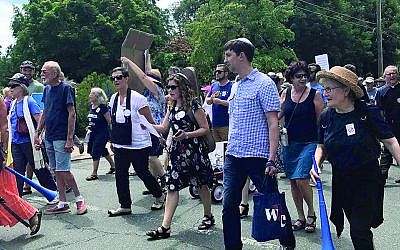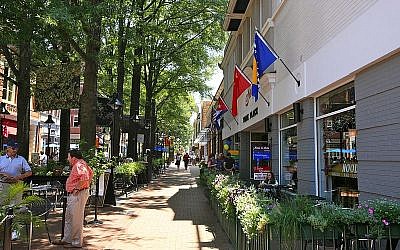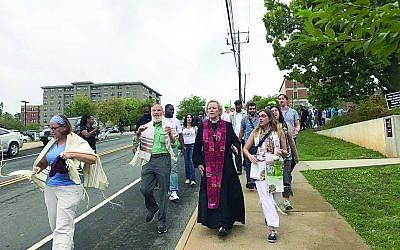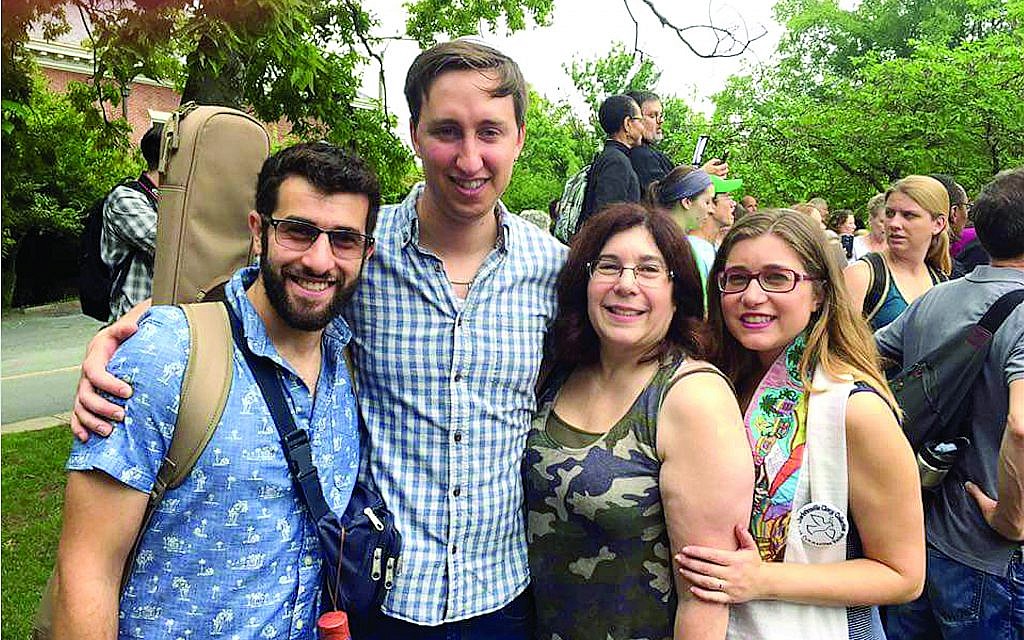Jewish Couple’s Charlottesville Memories
That weekend scared and strengthened rabbi and her husband.
From afar, the images from Charlottesville, Virginia, one year ago were horrifying and compelling.
For my nephew, Geoff Schmelkin, and his wife, Rabbi Rachel Schmelkin of Congregation Beth Israel, Charlottesville’s only Jewish congregation, the events of Aug. 11-12, 2017, left indelible memories.
Rachel: “I see neo-Nazis and white supremacists in white shirts and khaki shorts marching in the park. I hear chants of hate and the whirling of helicopters up above. I see the look on the face of an African-American teenager after a car plowed through a crowd of peaceful protesters and hit her sister. But it is not just horrible images that I see and hear. I see people from all different walks of life holding hands with one another. I hear songs of peace sung with every possible harmony. And I see people being brave, standing together, protecting one another. “
Get The AJT Newsletter by email and never miss our top stories Free Sign Up
Geoff: “Some of the images that stick with me are frightening: weapons, fights, people injured, running and crying. Other images are inspiring: interfaith services, volunteer medics, people standing together. As a Jew, one image is particularly emblematic. We left the sanctuary after Saturday morning services and entered the social hall to make Kiddush and hold an oneg. Without the music of our prayers reverberating in the sanctuary, it was quieter, and for the first time I could hear the thumping of the police helicopter overhead. Word spread that Nazis were outside of the synagogue. I looked out the window and saw their armed mob at the edge of our courtyard. It is a chilling image that I hope I never see again.”

That weekend’s “Unite The Right” rally may have been pegged to the city’s decision to remove statues of two Confederate generals from public parks, but the Jewish community had been targeted by the alt-right and Ku Klux Klan for months beforehand.
On Friday night, a few hundred torch-wielding exponents of hate marched through the University of Virginia campus, chanting (among other niceties) “Jews will not replace us.”
On Saturday morning, this swarm of white nationalists, white supremacists and other varieties of bigot clashed with counter-demonstrators downtown in Emancipation Park.
Across the street, clergy of numerous faiths stood in solidarity on the steps of First United Methodist Church, among them Rabbi Schmelkin, wearing her kippah and tallit and carrying her ever-present guitar.
Rachel’s plan for the weekend had been “to drown out the sound of hate with music of peace and love.”
Two blocks away, Geoff, who is pursuing graduate degrees in law and business at the University of Virginia, was at the Shabbat morning service.
Geoff is my sister’s oldest child. We celebrated his wedding to Rachel in Cincinnati in August 2015. She graduated in May 2016 from the Hebrew Union College Jewish Institute of Religion, and joined the Reform congregation in Charlottesville as associate rabbi two months later.
As chairman of Beth Israel’s security committee, Geoff had helped remove all but one of its Torahs, including a Holocaust scroll, for safe-keeping before the weekend.
Rachel worried about what was happening at her synagogue.
Geoff worried about what was happening down the street.
Later than warranted, Virginia’s governor declared a state of emergency.
Geoff and Rachel were close by when a neo-Nazi drove a car into people walking away from downtown, killing a young woman and injuring 19 people. “We ran there from First United Methodist Church. We live a block from where the car attack happened. We ran to get our car and took a young woman to the hospital,” Geoff said.
What scared them also strengthened the congregation of about 400 households.

“The events of last summer were frightening and deeply painful for many in our congregation, but our community has been very resilient. Not only have Jews in Charlottesville continued to make CBI their Jewish home, but they have also stepped outside of the walls of our synagogue, sometimes in very visible ways, to connect with others and do the hard work that needs to be done in Charlottesville around issues of racial justice,” Rachel said.
“The events of August 11-12 were traumatic, but so were the months prior to them and many of the months after. We have been steadily harassed over the past year by KKK rallies, alt-right rallies, online threats, hate graffiti and vandalism. Many of us have grown closer to one another through our shared experiences, and we have gotten more organized and become more resilient as a congregation,” Geoff said.
That weekend had a profound effect on the couple, both 29 years old.

“I never expected to see anti-Semitism like I saw last summer in my lifetime. Even in recent months, I have had the experience of taking a walk around the block and seeing a neo-Nazi sitting on a bench just a block away from the synagogue. There have been moments over the past year when I did not feel safe walking down the street with a kippah on my head,” Rachel said. “Yet, this experience has opened my eyes because, before this, I never wondered if I might be hurt or attacked because of my religion or some identifying marker. As a white Jew, I can take off my kippah and blend in. People of color can’t blend in, as I learned from one of my black friends who told me, ‘I’ve never felt safe in my body.’”
“I hope that people have learned that there comes a time when ordinary Americans need to go out into the street to stand up to Nazi bullies in their communities and bigots who come to town to intimidate. Where we ignore them, they fester and spread. In Charlottesville, we stood up to the fascists, and they were exposed for the criminals that they are,” Geoff said.





comments